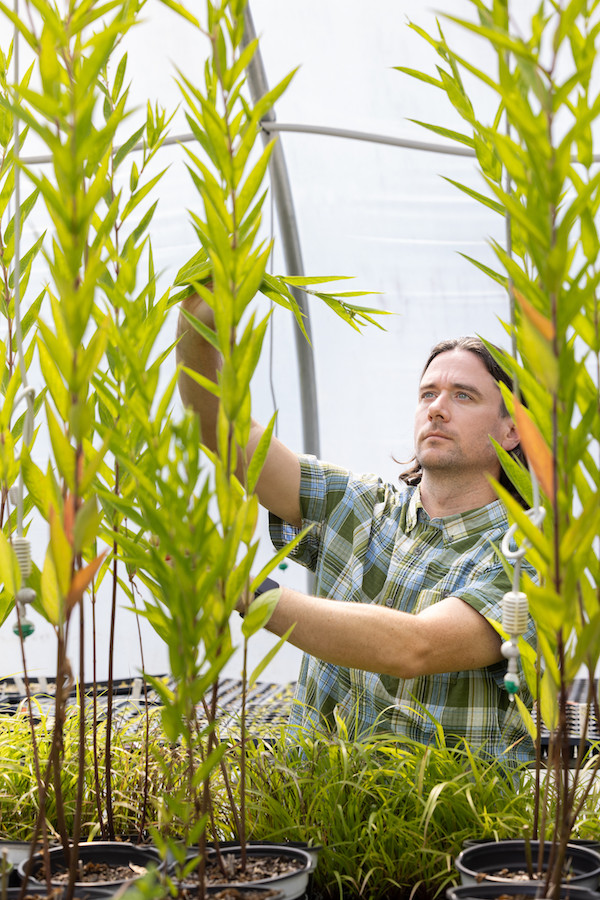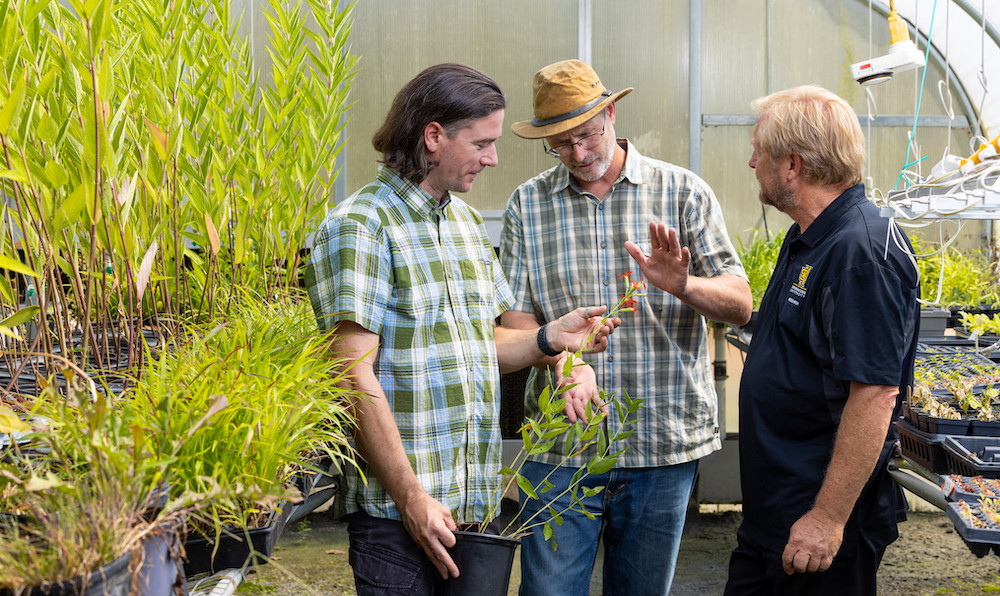

KENNESAW, Ga. | Jul 19, 2024

They want people to love weeds.
Using scientific acumen, the trio want people to reconsider certain plants as beneficial to the environment, thanks to a project housed at Kennesaw State University’s Field Station. There, the Safeguarding, Education, Propagation, and Applied Research Laboratory (SEPAL) project safeguards endangered plants and grows highly important native plants that help ecosystems thrive — the latter rarely get planted in home and business landscapes because of commonly available, non-native alternatives.
“The idea for this area is to have a refugium for plants that are on the decline or are already listed as endangered in Georgia,” said Bretfeld, an assistant professor of biology at KSU. “We're keeping these plants, making sure they survive in our raised beds area and then trying to propagate them so we can collect seed material and share it with other conservation partners.”
Skullcap and milkweed once grew prolifically in Georgia and the greater South. These plants offer food to pollinators and other insects that compose the food chain. In the South, these plants flower into the latter part of the year, which is important for migratory insects, too.
Bretfeld says, with those important roles in mind, he sees the project as an incubator and distributor of these and other native plants, making them available to conservation partners, nurseries, landscapers and consumers.
“This way we can increase the availability of native plants in the market which would help the native pollinators and just give it a whole big push in terms of native plant gardening,” he said.
Since arriving at Kennesaw State in 2019, Bretfeld has spread his love of plants while admitting he’s not much of a gardener himself. He says he can explain the science behind why and how plants grow, and anyone who asks him for advice receives a bit of a warning.
“I know the theory behind plant growth, but I don’t have a big green thumb,” he said.
Enter Duncan, who considers himself an arborist who sells people on botany. He earned his bachelor’s degree in biology from KSU in 2012 and then graduated in KSU’s inaugural cohort of the Master of Science in Integrative Biology in 2014.
Duncan started a nursery business, All About Natives, providing native plants of all kinds for customers who wanted to beautify their yards, but also worked with government entities such as the Georgia Department of Transportation on rewilding public rights of way.
He stayed connected with KSU, interacting with Blackwell, the director of operations at the Field Station, and then with biology professor Paula Jackson, who introduced him to Bretfeld. Immediately, Duncan found a kindred spirit who understood the importance of native plants like skullcap and milkweed to help strengthen most ecosystems.
“There are simple things that we can do that would make a huge difference, and what Dr. Bretfeld does is one of those things,” Duncan said. “It's growing native plants in quantity so that they can be available for restoration projects, home landscape projects, and hopefully KSU groundskeeping projects and research.”
Already, Bretfeld is part of the Georgia Plant Conservation Alliance, a conservation group that works with government agencies to propagate these beneficial plants, among other tasks. Duncan encouraged Bretfeld to join the group, and Bretfeld credits Duncan for forging partnerships with Georgia Department of Transportation and the Department of Natural Resources, among others.

The project couldn’t have gotten off the ground without the approval of Blackwell, also a plant enthusiast who greets nearly every request with a qualified “yes.” Blackwell pointed out three pillars of focus for the Field Station—controlled environment and urban agriculture, sustainable landscaping and architecture, and native and rare plant conservation. The SEPAL project checks all three boxes.
“Those three things that we've identified are our strengths based on some faculty that we have and the projects that we were already working on,” Blackwell said. “Our primary role is to support those things that are already here and then build upon these that we were trying to expand a little bit, especially interdisciplinary projects like with these endangered plants.”
Bretfeld said the project has interest from around campus, including the College of Engineering and Engineering Technology, the Office of Sustainability, and his own department; he sees native plants populating campus someday to help encourage green spaces as the campus expands.
“Recently this project has gained a lot of momentum,” he said. “We're thinking about doing some sort of sustainable landscaping as well, like do a little landscaping garden that shows what you can do to make your landscape or your backyard a little more pollinator friendly and have demonstration gardens. There's a lot of positive talk right now about these plants.”
In other words, the marketing of beneficial weeds is starting to take hold.
– By Dave Shelles
Photos by Matt Yung
A leader in innovative teaching and learning, Kennesaw State University offers undergraduate, graduate, and doctoral degrees to its more than 51,000 students. Kennesaw State is a member of the University System of Georgia with 11 academic colleges. The university's vibrant campus culture, diverse population, strong global ties, and entrepreneurial spirit draw students from throughout the country and the world. Kennesaw State is a Carnegie-designated doctoral research institution (R2), placing it among an elite group of only 8 percent of U.S. colleges and universities with an R1 or R2 status. For more information, visit kennesaw.edu.